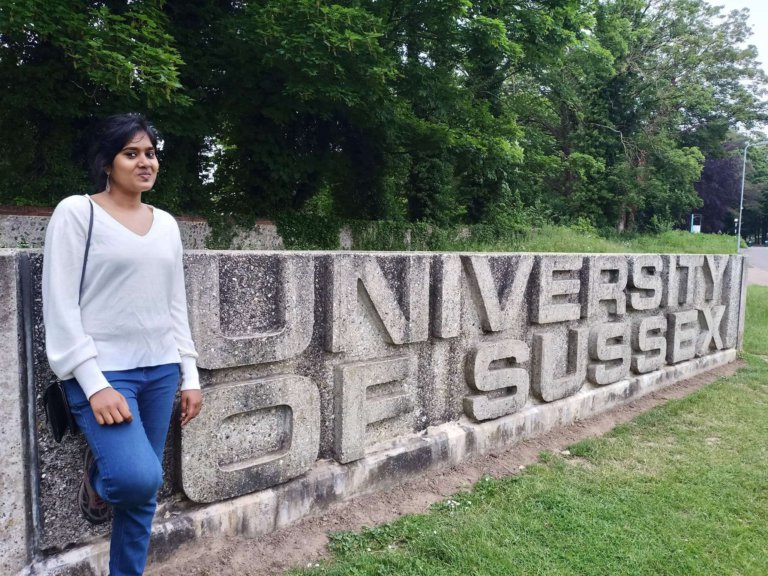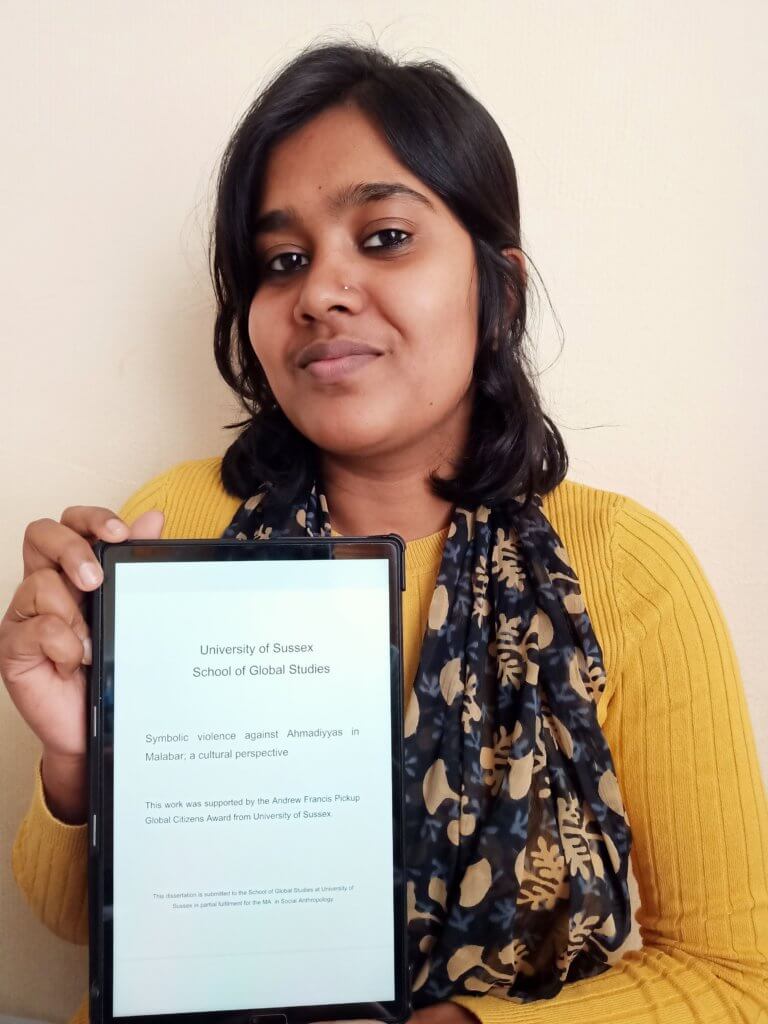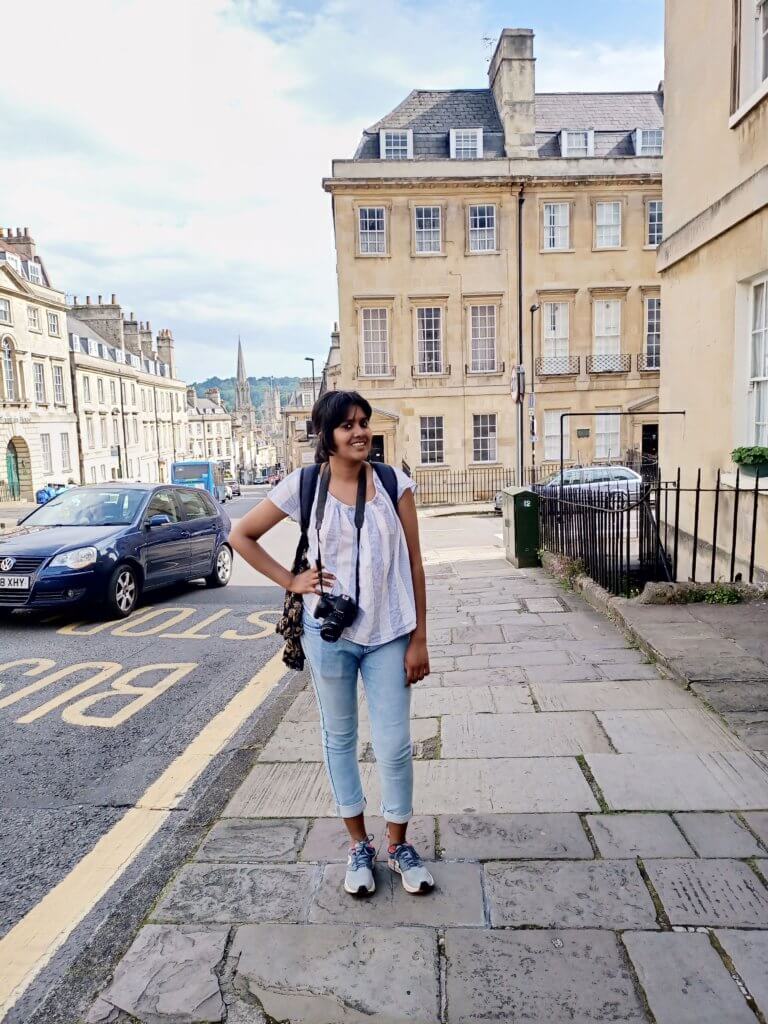
Social anthropology refers to the study of how people live in different social and cultural settings across the globe. From how we make money, to how we shop, resolve conflict, and form families, this is a subject that covers it all.
It’s no small range, but one Hafeesha Thoppil Babu, from Kerala in India, is determined to take far and wide with a degree from the University of Sussex.
After all, she showed the courage to continue despite failing at the start. First, she did not pass the National Eligibility Test (NET), the exam one needs to pass for the post of assistant professor and/or Junior Research Fellowship award in Indian universities and colleges. Then, she did not get the OBC Overseas Scholarship from the Government of Kerala.

What drew her to the UK was academic freedom. Source: Hafeesha Thoppil Babu
Below we speak to her on her interest in social anthropology, her life in the UK and her advice for other scholarship applicants:
Where does your interest in social anthropology come from?
When I was 14, I was chosen for the Little Journalists Programme conducted by the Madhyamam Newspaper in India. The news article I wrote appeared on their supplement page associated with the state-level school youth festival.
It brought me immense happiness and influenced me to choose journalism for my higher studies. Additionally, while doing my first master’s at the Central University of Hyderabad, I was able to work with minority communities and do research among them.
This redirected my interest in social anthropology. Thus, I came to the UK to earn my master’s in this field.
What made you choose to study abroad in the UK in the first place? Do you think it would have made a difference if you studied at a local institution?
I chose to study abroad as a result of failure. I couldn’t clear the NET in my first attempt. This then led me to think about international unis.
I chose the UK for many reasons. I found that the application process in the UK is easier than in any other country and it also has good ranking unis.
The visa process was also smoother compared to my friends’ experiences who opted for other countries. I found a big difference between the educational curriculum in India and the UK.
Through personal experience in the UK, I found that unis are more updated with the readings and they are well-organised with the syllabus and modules. Facilities are very approachable and the assessments are really more productive than back home.

“While doing my first master’s at the Central University of Hyderabad, I was able to work with minority communities and do research among them. This redirected my interest in social anthropology,” she says. Source: Hafeesha Thoppil Babu
Moreover, unis here help students find their area of interest and work on it independently. Academic freedom is the most fascinating thing about unis in the UK.
What made you apply for a scholarship at the University of Sussex?
I applied for the OBC Overseas Scholarship from the Government of Kerala in 2020. Although I was an eligible candidate as per the government order, I didn’t get it due to the mismanagement of the selection committee.
What do you like most about the UK?
Connectivity is the one thing I like most. Travelling from one place to another is such an easy and accessible thing here. The pedestrian-friendly system is another factor which I also like a lot. Another beautiful thing is the spring season and the varieties of marvellous flowers.
What have been your most memorable, non-academic experiences in the UK thus far?
One day, while I was waking up, I heard a sound that was not familiar to me and I thought it was someone throwing stones at my roof. I opened the window and it was raining ice (hailing). It was a wonderful sight for me so I held my hand against the rain, collected some hail and even swallowed a few of them. The sight of the sleets is one of the most memorable experiences I’ve had in the UK.
Tell me about your hometown. Where would you take us to visit?
I come from a small village called Eyyal in the Thrissur district of Kerala. If you come to visit, I would take you to Alleppey — one of the most beautiful tourist places where you’d see backwaters, serene beaches, historical churches, lake islands, migratory birds, and much more. We also have different freshwater fish, fresh “toddy” (palm wine) and “biryani” (Indian mixed rice dish).
What’s the local food compared to home like? Tell us your most and least favourite.
I’m from Kerala which is popular for its variety of spices. I love spicy foods which are not available here in the UK. Here, the food seems to me like it’s not very flavourful. However, my favourites are fish and chips, puddings, and cakes. Non-vegetarian food is my least favourite.
What do you miss from and how do you substitute it?
What I miss most is fish curry. I can’t get any kind of fish from home here. I also miss the breakfasts from my home country but I substitute them by trying the fish here and making breakfasts with what ingredients I can find.
What’s something from the UK you’re planning to bring back to your friends and family back home?
It would definitely be chocolates as the UK has a collection of various ones which are super tasty and cheap.

“I found a big difference between the educational curriculum in India and the UK,” she tells Study International. Source: Hafeesha Thoppil Babu
What advice would you give to international students looking to apply to the same scholarship as you or who want to study in the UK?
The first would be is to look at uni rankings. Secondly, explore the options you have for available scholarships beforehand. There are three types.
One is from the uni which will be less competitive but has specific deadlines. The second is from your home country from the government or NGOs and the third option are the international scholarships.
Explore all of these paths and be aware of the deadlines and application processes.
Do you have any tips to budget as a student abroad?
Yes, definitely. I use my part-time earnings to help pay rent and meet additional expenses. Generally, there is a notion that UK life is very expensive but my personal experience is entirely different.
It’s all about how we live. I usually buy necessities from Aldi (a cheap and affordable grocer’s here), buy clothes and other miscellaneous items at charity shops, and also buy things from Poundland where you can get things for 1 pound.
This is how I manage my budget over here. Even though I cook Indian food every day, my maximum spending on food and groceries is around 60 pounds a month.
Lastly, can we round up with three fun facts about yourself?
I cook and eat anything (I’m hungry all the time), I have a huge crush on Malayalam film actor Joju George (one of my wishes is to hug his belly), and looking at the sky thinking about nothing is one of my greatest hobbies.







